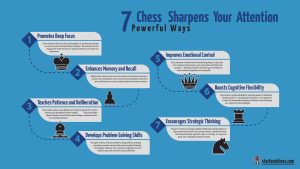7 Powerful Ways Chess Sharpens Your Attention
In today’s distraction-filled world, the ability to concentrate and maintain focus is more valuable than ever. Whether you’re navigating work tasks, academic challenges, or personal goals, having a sharp attention span can make all the difference.
One surprising yet effective way to enhance this skill is through the strategic game of chess. As a centuries-old game of intellect and strategy, chess does more than just entertain—it trains the mind to stay focused, think critically, and make calculated decisions.
The process by which chess sharpens your attention is fascinating and multifaceted. Each move on the chessboard demands deep concentration, strategic foresight, and the ability to adapt to changing scenarios.
By regularly engaging in chess, you not only enjoy the thrill of the game but also cultivate a sharper, more attentive mind. In this article, we will explore seven powerful ways in which chess sharpens your attention, helping you to apply these benefits to various aspects of your life.
- How does chess promote deep focus?Chess requires players to concentrate intensely on each move, consider multiple strategies, and anticipate the opponent's responses. This sustained focus trains the brain to block out distractions and improve attention span, making it easier to concentrate on tasks in everyday life.
- How does chess help improve attention and focus?Chess requires players to analyze positions, consider multiple possibilities, and anticipate their opponent's moves. This intense mental engagement helps develop sustained attention and the ability to focus on complex tasks.
- How can I start using chess to improve my attention?Start by playing chess regularly, either online or with a physical board. Focus on your moves and avoid distractions. Over time, challenge yourself with more complex games and strategies to further enhance your attention and cognitive skills.
- Can chess help adults maintain or improve attention as they age?Absolutely. Chess is an excellent mental exercise that helps maintain cognitive functions, including attention, as adults age. It can also reduce the risk of cognitive decline and dementia.

-
Promotes Deep Focus
Chess is a game that requires one to have absolute concentration. The very second you sit down on the board, every move requires cogent thinking, precise calculation, and an opponent’s move grasped in advance. Such an effect from deep focus in practice trains one’s mind to give attention to what is before them and bar from view those things that would impede flow.
The depth of attention required in a chess game is not a response to what your opponent does, but requires long-term plans whereby you have to think far ahead. It thus lays the ground for sustained concentration, enhancing your capability to focus on complex activities over a long period, and enabling you to be more effective in other spheres of life, whether studying, working on a project, or even attending to day-to-day conversations.
The deep focus developed while playing chess has long-lasting benefits far outside the realm of the game itself. In developing this ability to sustain your concentration in a game of chess, you are building a sort of mental resilience to hold onto throughout your daily routine.
The more easily you can focus on something, the more efficiently you are able to complete tasks, the less likelihood of mistakes, and the better quality of work you will have done. Living in a world full of distractions, the ability to focus deeply is a skill; chess is one of the best methods to develop and improve this ability.
-
Enhances Memory and Recall
Memory plays an important role in playing chess because it deals with remembering the previous move you made or your opponent took, patterns that appear on the board, and strategies that may happen in the future. Every move you make, you base on your memory of how a particular case happened in other games or in this very game.
Such mental exercises significantly activate your short-term memory and help remember the flow of events in the game for making right decisions. And in time, the constant practice of recall and application of your past experience sharpens your long-term memory, too, making complex sequences more memorizable, strategies too.
The improvement in memory away from the chessboard is exceptional. Teaching your brain to remember and recall intricate information throughout a game, you build a healthier, more considerable memory capacity to do other things in life.
If you are a student, for example, this can be really useful in academia since many students need to remember large amounts of facts, figures, and concepts to achieve success. This has a carryover effect on professional life in that one will be sure to make informed decisions with material being remembered. Chess, therefore, trains not just a better player but one with a keener and more reliable memory.
-
Teaches Patience and Deliberation
Chess is that kind of game that rewards patience and punishes haste. Every move should be well thought out, because one wrong move can change the outcome of the whole game. It is due to this very need for deliberation that players learn to slow down their thoughts, weigh their options, and not rush into a decision.
The afterthought of the consequences of every move before executing one installs in a player’s mind a sense of patience, where considered thought reigns over impulsive action. This way of going about deciding on what to do and at what time is boundless and highly valuable, both within and outside chess, as it pertains to real-life scenarios to which patience and proper planning can afford the option of yielding better results.
Patience learned from chess also helps in managing frustration to avoid impulsive decisions. Living in a world that often urges quick fixes and immediate results, chess teaches the value of waiting for just the right moment to act. This skill is particularly useful both in personal and professional settings, where long-term success often depends upon the ability to stay patient and persistent. Chess is also helpful in developing your self-discipline in that it teaches you to deliberate over the move you will carry out before actually making it and hence, giving you an opportunity to reflect over a certain situation rather than just reacting instinctively.

-
Develops Problem-Solving Skills
Every chess game is a series of big problems to be solved. Whether finding the best move, getting out of a troublesome position, or planning a number of moves in advance, chess continuously challenges your problem-solving skills. This constant workout in the mind shapes and tempers the ability to analyze situations and options and to come up with effective solutions.
In chess, every move that you make should be with reasoning ability and problem-solving characteristic, either opening ways to the rest of moves or creating barriers; hence, it makes you keep your head clear and think strategically.
The problem-solving skills sharpened through chess are highly transferable in other areas of life. The capability to tackle challenges with a clear, analytical frame of mind is invaluable from both a personal and professional perspective.
Chess teaches you how to break down complex problems into manageable parts, consider different perspectives, and weigh the potential outcomes of your decisions. The systematic approach to problem solving will, therefore, create confidence and clarity for you when approaching even tricky situations, making you a better decision-maker in all spheres of life.
-
Improves Emotional Control
Chess is a game of strategies, yet again, it encompasses emotions: from highs accompanying every advantage gained down to the low of a potential loss, even the most seasoned players are being tested. For a person to be successful in chess, he has to learn how to manage his emotions and remain calm under pressure, whatever the circumstances.
This emotional regulation is what allows the making of clear, rational decisions since letting emotions rule over your moves can make you commit costly mistakes. These skills nurtured through time, as playing chess imparts the right way of managing your emotions so that in the face of high-stress situations, you remain poised and attentive to details.
The emotional control developed through chess has far-reaching benefits outside the realms of the game. This means, in actual life, the ability to manage one’s emotions and stay focused under pressure contributes to prosperity and good fortune.
Be it facing a difficult situation at work, negotiating a situation that is going awry, or getting over a personal jolt, chess teaches you to stay serene and make considered decisions. In chess, improvements in emotional regulation not only help you become a better player but also provide you with that mental elasticity to deal with life’s ups and downs graciously.
-
Boosts Cognitive Flexibility
Cognitive flexibility is the ability to switch your line of thought concerning evolving circumstance. Playing chess is some sort of masterclass in the development of cognitive flexibility. In each game, you have to constantly adjust the strategy according to what your opponent does and how progressively the board changes. Because of this necessity for flexibility and rapid thinking, it sharpens your cognitive flexibility when you switch focus and are adaptive more quickly. Changing the track when this is necessary is very important in chess, where adhering too much to a plan often means defeat upon unexpected situational changes.
The cognitive flexibility one learns from chess applies to many areas of real life, too. It is an excellent skill that will help them in case of a sudden change at work, a new challenge in their personal life, or a problem that has to be solved instantly. Chess teaches you to approach every situation with a big heart to adjust to new information. Such adaptability would help one keep eyes and concentration on what is relevant when circumstances around keep changing and, therefore, make them more resilient in dealing with every challenge life presents.
-
Encourages Strategic Thinking
Chess is a game of strategy, where each move is intended to help in outmaneuvering one’s opponent. In most instances, success in the game requires one to think way ahead, including not only their moves but also the potential ones of the opponent. This is actually quite strategic and requires one to have a great sense of detail lest the overlooking of a minute factor might prove greatly costly. Chess is all about being critical and creatively planning, developing your ability to focus on long-term goals amidst the game’s complexities.
Chess fosters such strategic thinking, which can become very serviceable in other domains of life, such as moving one’s career, managing projects, or simply setting personal goals. Chess teaches one to approach challenges with a clear, goal-oriented mindset, considering both immediate and long-term implications of decisions. Chess, by encouraging strategic thinking, builds not only your game but also arms you with the wherewithal to navigate life’s complexities with foresight and precision.

Conclusion
Chess is far more than just a game; it’s a dynamic tool that can transform the way you think and focus. By engaging with the strategic challenges chess presents, you can experience firsthand how chess sharpens your attention and strengthens your mental abilities. The benefits extend beyond the chessboard—enhancing your focus, memory, patience, problem-solving skills, emotional control, cognitive flexibility, and strategic thinking can lead to significant improvements in all areas of your life.
Imagine the impact of being able to stay deeply focused on tasks, make thoughtful decisions under pressure, and adapt quickly to changing circumstances. Chess sharpens your attention in a way that provides a fun yet powerful method to train your mind. So, whether you’re an experienced player or just starting, embracing chess can be your next step toward achieving mental clarity and heightened attention in everything you do. Set up the board, and let the game begin—your mind will thank you.
We’ve prepared a podcast to accompany this article, offering the same insights in an audio format. If you enjoy listening, give it a play:
References:
- Chabris, C. F., & Hearst, E. (2003). “The Role of Memory in Chess.” Psychology of Learning and Motivation.
- Flow, C. S. (2007). “Chess and Emotional Intelligence.” Journal of Psychology and Chess.
- Scholz, U., & Wenzel, M. (2014). “Cognitive Flexibility and Strategic Thinking in Chess.” Cognitive Psychology Review.
- Burgoyne, A. P., et al. (2016). “The Cognitive Benefits of Chess: A Review.” Educational Psychology Review.



0 Comments